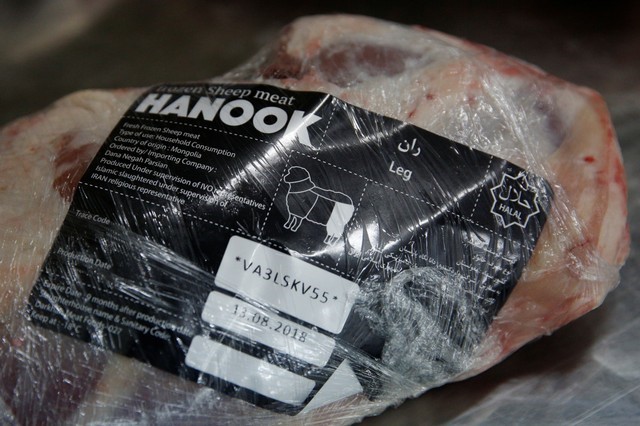By Munkhchimeg Davaasharav
DARKHAN, Mongolia (Reuters) - Mongolian butcher Kuntuguan Ajbai chants under his breath as he slits the throat of a sheep with a single stroke of his sharpened knife, making sure the animal's swift death is halal – acceptable under the laws of Islam.
Kuntuguan's work at a slaughterhouse in the city of Darkhan, about 100 miles (160 km) from the nation's capital, comes amid surging demand from Iran for halal meat and as Mongolia pushes to make more money from the huge herds of livestock that roam its vast grasslands.
"This is a special ritual we do while slaughtering," said Kuntuguan, a 27-year-old Muslim of Kazakh extraction, his rubber boots and white apron splattered with blood.
"We do it in the name of Allah to get permission to kill the animals."
Mongolia has an estimated 30 million sheep - more than New Zealand - but has until recently only managed to export a thin slice of its overall meat output. It hopes that will change as it taps overseas appetite for halal mutton from places such as Iran, which are forced to import due to limited local production.
Largely because of that kind of new demand, Mongolia's sheep and goat meat shipments hit 2,601 tonnes in 2017, 11 times more than 2016.
And while that was worth only around $8 million, industry officials say those volumes are likely just the start, with exports in the first-half of 2018 quadrupling year-on-year to 775.6 tonnes.
"The halal meat market is growing worldwide, promising new opportunities for Mongolia," said Ochirbat Begz, executive director of the Mongolia Meat Association. For graphic on Mongolia livestock herds, click https://tmsnrt.rs/2Leefg6
PASTURES OF PLENTY?
Under pressure from the International Monetary Fund to diversify away from mining, Mongolia has been trying to turn its huge pastoral economy into a major earner, hoping its free-range organic meat will find a home on plates overseas.
The plant where Kuntuguan works is run by Darkhan Meat Foods, which along with rival meat producers Max Impex (MNE:MMX) and Max Market is rushing to supply mutton to Iran.
It employs around 200 workers at the site, all involved in halal mutton output, and expects to double its exports of the meat in 2018 from 1,320 tonnes last year.
"Before contracting with an Iranian company, we only exported beef and horse meat to other countries," said Otgon-Erdene Bavuudorj, the firm's general manager.
During a visit to the plant by Reuters, around a thousand 18-month old sheep were slaughtered and then deboned, chopped and packed under the supervision of experts from Dana Negah Parsian, an Iranian importing company, as well as the Iranian Veterinary Organisation.
The mutton is then frozen and transported by truck through Russia and Kazakhstan, reaching Iran in about two weeks.
For graphic on Room for more: Mongolia eyes meat production, export growth, click https://reut.rs/2nViCUr
ROOM TO IMPROVE
But Mongolia's nascent halal meat industry faces a number of hurdles on the path to growth.
Seyed Erfan Esfahani, business manager with the Iranian importer, said the country still needed to improve technology at its slaughtering plants and to train more staff.
In order for meat to be deemed halal, the butcher who slaughters animals must be Muslim. Mongolia is predominantly Buddhist, but 100,000 mostly-Muslim Kazakhs account for around 3 percent of its population.
The nation has also struggled with foot-and-mouth disease, with an outbreak this March forcing the government to declare martial law in 12 provinces and distribute 500,000 vaccines.
Mongolia has drawn up new animal health legislation to fight such diseases, with the Iranian importers saying they were doing all they could to guarantee meat they buy is safe.
"I check sheep before slaughtering, and have not seen any major problems with animal diseases, said Hamid Reza Kavosh, head of the veterinary office in Iran's Khuzestan province, while at the Darkhan plant.
Another problem is the seasonal nature of meat production in Mongolia.
"Putting livestock to pasture is good in the sense that they are free to choose the best grazing area and drink clean water from nature," said Ochirbat at the country's meat industry body.
"But importing countries demand regular supplies, which is impossible to meet with pasture, so export-oriented farms need to be developed," he added.
The reintroduction of trade sanctions on Iran by the United States could also cloud the horizon. Washington has warned there will be consequences for countries that do not respect the sanctions.
But Ochirbat played down such worries, saying it was still early days for halal exports to Iran.
"It's a little business-to-business trade (at this stage) and not a big international cooperation or something, so it should be okay," he said.
